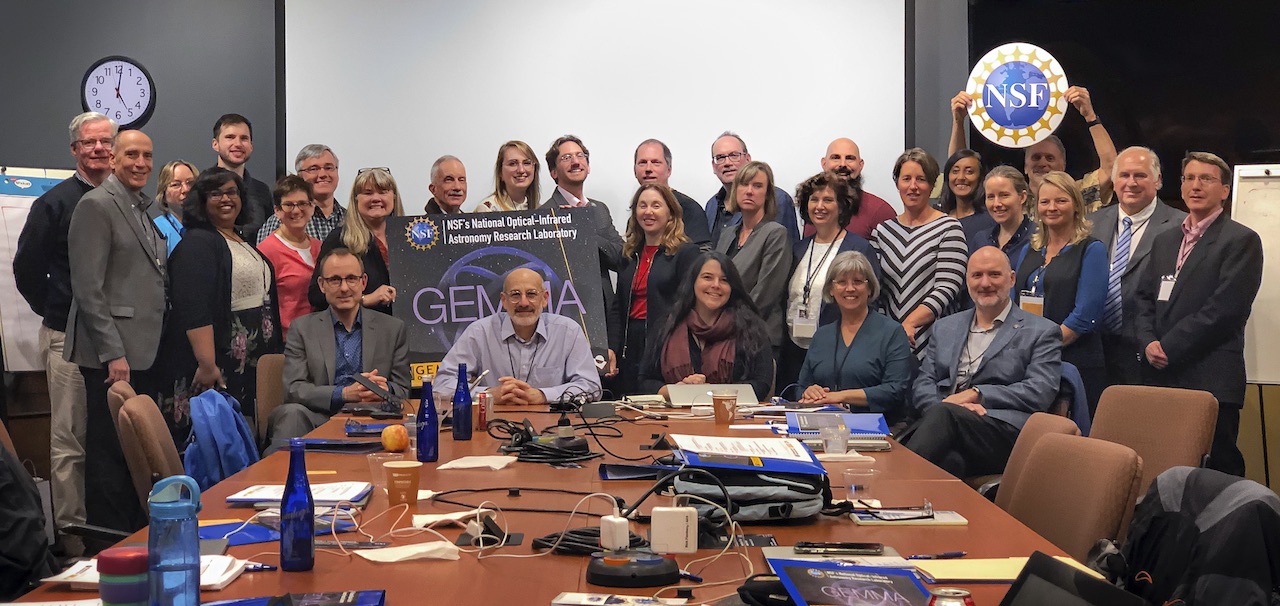Virtual media workshop on multi-messenger and time-domain astronomy 2021
Scientists and science communication professionals from a collection of institutes, including NSF, NSF’s NOIRLab, NASA, AURA, and various European observatories, have published a white paper detailing best practices for science communication on behalf of large, multi-institutional collaborations.
The biggest breakthroughs in science have always relied on collaboration, and the scale and complexity of astronomical collaborations have increased as astronomers set more and more complex goals. From the Event Horizon Telescopes’s worldwide network of 13 telescopes to the LIGO Scientific Collaboration, big science is increasingly done by large international multi-institutional collaborations.
This plurality of scientists, instruments, and collaborations enables unprecedented scientific discoveries but also makes communicating results difficult. Communicating breakthroughs from collaborators scattered across the globe poses a formidable challenge in timing, cooperation, and coordination.
Scientists and astronomy communication professionals from around the world gathered to address these challenges at a summit in November 2019. Drawing on the experience of sharing some of the biggest astronomy breakthroughs of the decade, they outlined best practices for large astronomy media campaigns. Their collected experience, guidelines, and best practices have now been published in the white paper document — Best Media Practices for Multi-institutional Science Collaborations. The paper and workshops were funded under a grant from the NSF called Gemini in the Era of Multi-Messenger Astronomy (GEMMA) which also funds new instrumentation and tools for astronomers using the Gemini Observatory, a program of NSF’s NOIRLab.
Results from this white paper were presented at a virtual media workshop on multi-messenger and time-domain astronomy on 8 January 2021. The workshop was offered jointly by NOIRLab and the AAS Press Office as part of the 237th meeting of the American Astronomical Society (AAS), and brings together astronomers, science journalists, and other professional science communicators.
Original announcement of the workshop for 8 January 2021. Journalists were invited to a special workshop at the 237th meeting of the American Astronomical Society.
GEMMA communication summit 2019
In early November, the GEMMA (Gemini in the Era of Multi-Messenger Astronomy) project brought together science communications professionals to explore the unique opportunities and challenges of communicating Multi-Messenger and Time-Domain Astronomy, two rapidly growing fields in astronomy. Funded by the US National Science Foundation, this communications summit hosted more than 30 participants for two days at the Space Telescope Science Institute (STScI) in Baltimore, Maryland, an AURA-managed facility.
Read all about it here: http://ow.ly/VCTU50xgmOx

The group of approximately 30 communicators attending the GEMMA Communications Summit held on November 7–8 2019 in Baltimore, USA. At the back (L–R) are: Martin Hendry (LIGO), Richard Terrile (JPL), Christine Pulliam (STScI/NASA), Swati Sureka (NSF), Matthew Dudley (Johns Hopkins University), Ivy Kupec (NSF), Peter Edmonds (Chandra/NASA), Janice Harvey (NSF’s OIR Lab/Gemini), Dave Finley (NRAO), Iris Nijman (NRAO), Joshua Chamot (NSF), Robert Hurt (Caltech/IPAC), Elizabeth Landau (JPL), Gordon Squires (TMT), Whitney Clavin (Caltech), Shari Lifson (AURA), Ethan Siegel (Blogger, Forbes), Megan Watzke (Chandra/NASA), Ranpal Gill (LSST), Amanda Kocz (GMT), Peter Michaud (holding NSF logo, NSF’s OIR Lab/Gemini), Janesse Brewer (facilitator, 23.4 Degrees), Ray Villard (STScI/NASA), John Blakeslee (NSF’s OIR Lab/Gemini) Front (L–R): Lars Lindberg Christensen (NSF’s OIR Lab), Rick Fienberg (AAS), Pamela Gay (PSI), Heidi Hammel (AURA), Chris Davis (NSF). Missing are Nancy Levenson (STScI) and Hussein Jirdeh (STScI/NASA). Credit: NSF’s OIR Lab/NSF/AURA